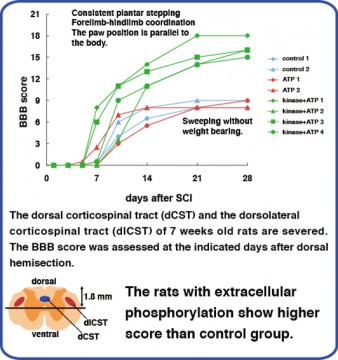Ecto-domain phosphorylation promotes functional recovery from spinal cord injury
Journal Paper Information
Scientific Reports 4, SREP-13-04540, DOI: 10.1038/srep04972 (2014).
Kenji Suehiro1, Yuka Nakamura2, Shuai Xu1, Youichi Uda1, Takafumi Matsumura1, Yoshiaki Yamaguchi3, Hitoshi Okamura3, Toshihide Yamashita2 and Yoshinori Takei4
1Department of Genomic Drug Discovery Science, 3Department of Systems Biology, and 4Department of Nanobio Drug Discovery Science, Graduate School of Pharmaceutical Science, Kyoto University, Kyoto, Japan and 2Department of Molecular Neuroscience, Graduate School of Medicine, Osaka University, Osaka, Japan 8
Outline
The adult mammalian central nervous system (CNS) cannot be repaired spontaneously after injury, which is partly due to the myelin-associated proteins including Nogo-A, myelin-associated glycoprotein and oligodendrocyte myelin glycoprotein. Nogo-66 receptors (NgRs) are common receptors for those myelin-associated inhibitors of the regeneration, as well as chondroitin sulphate proteoglycans, another group of regeneration inhibitors.  We previously reported that treatment of cells with protein kinase A (PKA) phosphorylated the ecto-domains of NgRs, which impedes the binding of the myelin-associated agonists1. Here, we found NgR1 expression in neural stem/progenitor cells (NSPs) derived from the adult rat spinal cord. Inhibition of NgR1 during differentiation of NSPs increased the proportion of neuronal cells in the differentiated cells, which indicate that NgR1 in NSPs can inhibit neuronal differentiation. As expected from those in vitro results, administration of PKA plus ATP to the injured spinal cord phosphorylated NgR1 in vivo. The treatment induced neuronal progenitor cells in the spinal cord, which is strictly inhibited without the treatment. Furthermore, paralysis caused by the spinal cord injury is significantly recovered by the administration of PKA plus ATP. These results suggest that activation of NgR1 in NSPs of the adult spinal cord can inhibit neuronal differentiation, which appears to be a critical reason for insufficient regeneration of the adult spinal cord.
We previously reported that treatment of cells with protein kinase A (PKA) phosphorylated the ecto-domains of NgRs, which impedes the binding of the myelin-associated agonists1. Here, we found NgR1 expression in neural stem/progenitor cells (NSPs) derived from the adult rat spinal cord. Inhibition of NgR1 during differentiation of NSPs increased the proportion of neuronal cells in the differentiated cells, which indicate that NgR1 in NSPs can inhibit neuronal differentiation. As expected from those in vitro results, administration of PKA plus ATP to the injured spinal cord phosphorylated NgR1 in vivo. The treatment induced neuronal progenitor cells in the spinal cord, which is strictly inhibited without the treatment. Furthermore, paralysis caused by the spinal cord injury is significantly recovered by the administration of PKA plus ATP. These results suggest that activation of NgR1 in NSPs of the adult spinal cord can inhibit neuronal differentiation, which appears to be a critical reason for insufficient regeneration of the adult spinal cord.
(1) Takei, Y. Phosphorylation of nogo receptors suppresses nogo signaling, allowing neurite regeneration. Sci Signal 2, ra14 (2009).
